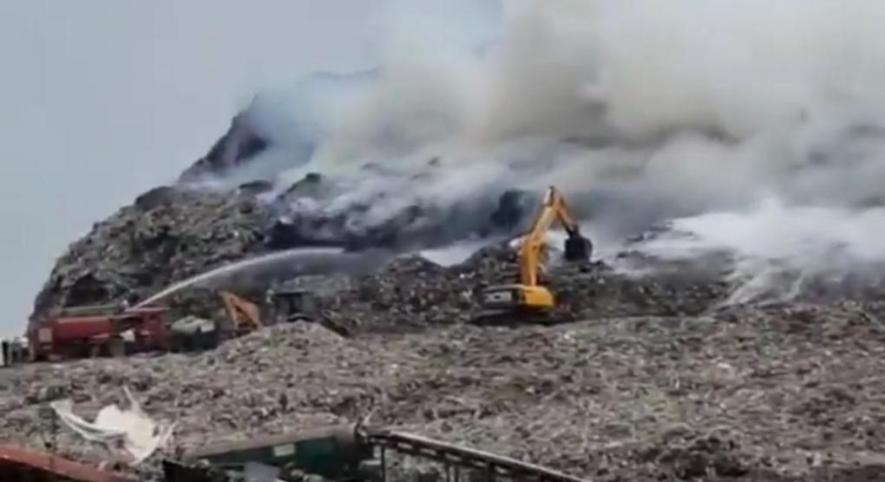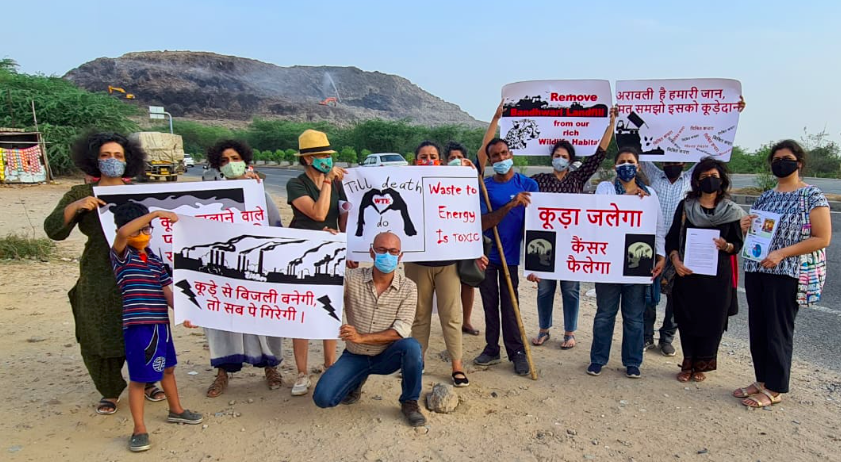Bandhwari Landfill Catches Fire; Protest against Waste to Energy Plant Continues

Amid the ongoing protests in Gurgaon to restore the green cover of Aravallis and minimise waste and pollution, the Bandhwari landfill, one of the biggest in North India and spread across 32 acres, caught fire this week. While the fire was brought under control much later owing to the rains in the city, the instance and the ongoing efforts to create a ‘Waste to Energy’ plant have yet again shifted the focus onto the failures of the implementation of the solid waste management rules (2016) along with the need for sustainable and viable options to manage waste.
Bandhwari landfill, which receives almost 2,000 tonnes of solid waste every day, is at the heart of the stretch between Gurgaon and Faridabad. The heap of waste has grown over 40 metres in size as no concrete solution is being offered by the state government. The resident groups see the ‘Waste to Energy’ plant as a non-viable option, which would only add to their woes while furthering corporate interest in the region. That is why they have been protesting against the plant.

The plant was proposed in 2017 and was to be set up by Ecogreen Energy Private Limited at the site. The company has a contract to collect house waste from Gurugram and Faridabad districts. Over 10 acres of land has been provided to the firm but protests against the plant have been raging. On Monday, citizens’ group Aravalli Bachao held a protest at the site of the landfill to highlight the dangers involved in the creation of the plant. They stated, “The waste-to-energy (WTE) plants have not worked anywhere in India as Indian waste composition is not suited for burning in such plants. Out of 11 WTE plants set up in India, most have closed down. The three or four that are operating are emitting toxic gases way beyond permissible limits”
WTE plants have focused largely on burning down trash in a bid to generate heat and potential electricity generation, however the plants have proven to generate toxic gases.
Speaking to NewsClick, Sonia Garga pointed out the issues with the WTE plant as a solution. She explained, “Gurgaon (Gurugram) generates more than a 1000 tonnes of waste each day, all of which is mostly unsegregated. Any waste management is focused on source segregation. Presently, over 92% of the waste is going to the dump yards and only 8-9% is recovered by the waste workers, which is an extremely low recovery rate. When we focus on waste handling it has to be decentralised. WTE plants are positioned as magic wands, however, history and our experiences have shown that this is not a solution to move forward. No developed country is moving ahead with this solution. The energy that will be generated is essentially heat that is generated by burning of waste. If the raw material is mixed and is of a high moisture rate, the WTE plant will not give the desired electricity units that it has been designed for. Despite spending so much money, it will lead to the damage of not just forests, it will also not work out in terms of financial viability. “
The citizen’s group states that over 100 villages will be affected by the plant and the accidental fires are likely to continue due to the high generation of methane gas, making the area inhabitable and increasing pollution levels.
Speaking to NewsClick, activist Bhavreen Kandhari, who is a part of the Warrior Moms group of concerned mothers from all over India who have joined hands to demand clean air, said, “Landfills will always be fire-hazard due to high levels of methane gas emissions… The question is why do we have landfills in the first place--it’s emitting toxicity that residents and our children are breathing every second of their lives. Why are tonnes of mixed waste ending up in landfills? Why are solid waste management bye-laws of 2016 not being implemented? Why is the Extended Producer Responsibility (EPR) by corporates/companies who make a fortune not being prioritised? Non enforcement of laws should be treated like a crime now; after all, it’s about the irreversible damage that is affecting the lungs and lives of our children.”
The Aravalli Bachao group has been liaising with the Haryana government, however, the negotiations have not yielded a substantial response.
Get the latest reports & analysis with people's perspective on Protests, movements & deep analytical videos, discussions of the current affairs in your Telegram app. Subscribe to NewsClick's Telegram channel & get Real-Time updates on stories, as they get published on our website.
























